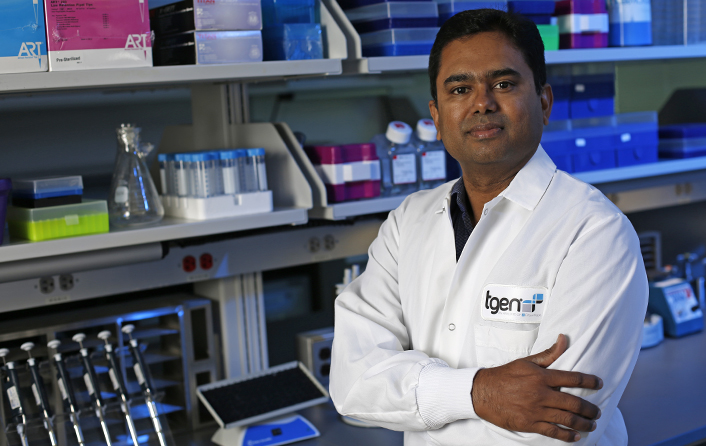
-
- Posted Tuesday September 25, 2018
$2.8 million federal grant awarded to TGen-UNM consortium to address diabetic blindness
Condition causes as many as 24,000 Americans to go blind each year
PHOENIX, Ariz. — Sept. 25, 2018 — Diabetes is an increasing global epidemic that is expected to grow by more than 50 percent in the next two decades, leaving more than half a billion patients worldwide exposed to potentially life-altering medical complications, including pain and numbness in the feet, lost limbs, life-threatening disorders of the heart, liver and kidneys — and even blindness.
In a major new initiative to help diabetics, the National Institutes of Health (NIH) has awarded a $2.8 million grant to the Translational Genomics Research Institute (TGen), an affiliate of City of Hope, and to the University of New Mexico (UNM) in a groundbreaking effort to discover new treatments for diabetic blindness.
Known as diabetic retinopathy, this disease is one of the nation’s leading causes of blindness, afflicting as many as 24,000 Americans each year. Nearly 2 of every 5 patients with diabetes also develop diabetic retinopathy.
TGen and UNM will lead a consortium that includes Harvard University’s Joslin Diabetes Center, and NIH’s National Eye Institute.
Because diabetic retinopathy can affect patients in so many varying ways, the study will focus on possible genetic causes of this disease, which could potentially lead to precision medicine-based treatments that would help thousands preserve their sight.
“We hope our findings will result in a diagnostic for early prediction of disease severity, development of new biomarkers, and improved therapeutic targets that may prevent the progression of diabetic retinopathy,” said Dr. Sampath Rangasamy, Ph.D., Research Assistant Professor in TGen’s Neurogenomics Division, and the study’s Principal Investigator at TGen.
Dr. Rangasamy — a Type 1 diabetic for more than 30 years — is an expert in diabetic blindness who formerly worked at UNM under Dr. Arup Das, M.D., Ph.D., Regents’ Professor and Chief of Ophthalmology at the UNM School of Medicine, and the study’s Principal Investigator.
“Our scientists are engaged in understanding the molecular mechanisms of prevalent diseases like diabetic retinopathy,” said Dr. Das, a pioneer in this area of study who specializes in the restoration of vision of these patients at the UNM Eye Clinic. “We aim to make new discoveries that will translate into new and more effective therapies for patients.”
The study includes three crucial objectives:
- Consistently examine why some patients progress to the sight-threatening forms: proliferative diabetic retinopathy (PDR), and diabetic macular edema (DME) — and why some patients are “protected” from diabetic complications.
- Use genomic sequencing to identify all possible genes associated with diabetic retinopathy.
- Examine proteomic changes that may characterize individual patient variations beyond DNA testing.
The study will place an emphasis on American Indian and Hispanic patients who are at higher risk of developing diabetes and diabetic retinopathy. A key question the study will address is why some patients respond well to current FDA-approved anti-VEGF therapy, and others do not.
“Our goal is to understand the great genetic variability of this disease, and to establish a molecular profile that can predict the severity and treatment of this disease for each patient,” said Dr. Jeffrey Trent, TGen President and Research Director, and also a study Co-Investigator.
City of Hope has a long and impressive history of groundbreaking discoveries in the field of diabetes. Dr. Arthur D. Riggs, Ph.D., the Samuel Rahbar Chair in Diabetes & Drug Discovery and director of the Diabetes & Metabolism Research Institute at City of Hope, renowned for his work on synthesizing the first man-made gene and using synthetic genes to produce human insulin, said this grant is urgently needed.
“Diabetic retinopathy, with loss of vision, is a serious, common and debilitating problem associated with the complications of diabetes,” Dr. Riggs said. “This study is an exciting approach to understanding the molecular and genetic mechanisms involved, and it makes use of the extraordinary technology and expertise available at TGen and City of Hope.”
Underscoring the urgency of the study is the fact that worldwide the number of patients with diabetes is expected to grow by more than half in the next two decades; from about 415 million today, to an estimated 642 million by 2040. The annual economic impact of diabetic retinopathy in the U.S. alone is estimated at nearly $500 million.
# # #
About TGen
Translational Genomics Research Institute (TGen) is a Phoenix, Arizona-based non-profit organization dedicated to conducting groundbreaking research with life changing results. TGen is affiliated with City of Hope, a world-renowned independent research and cancer and diabetes treatment center: www.cityofhope.org. This precision medicine affiliation enables both institutes to complement each other in research and patient care, with City of Hope providing a significant clinical setting to advance scientific discoveries made by TGen. TGen is focused on helping patients with neurological disorders, cancer, diabetes, and infectious diseases, through cutting edge translational research (the process of rapidly moving research towards patient benefit). TGen physicians and scientists work to unravel the genetic components of both common and rare complex diseases in adults and children. Working with collaborators in the scientific and medical communities literally worldwide, TGen makes a substantial contribution to help our patients through efficiency and effectiveness of the translational process. For more information, visit: www.tgen.org. Follow TGen on Facebook, LinkedIn and Twitter @TGen.
Media Contact:
Steve Yozwiak
TGen Senior Science Writer
602-343-8704
[email protected]


